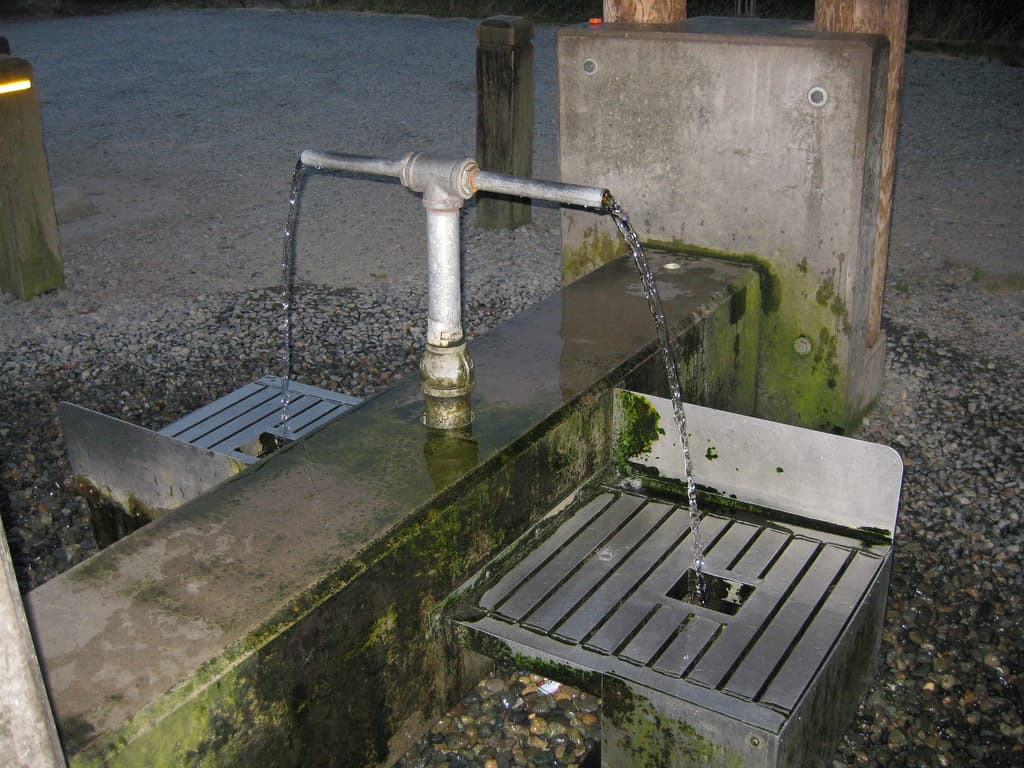Advertisement
Study: Well-Water Can Raise Arsenic Levels In Formula-Fed Babies
Parents already concerned by recent revelations about arsenic in rice, grains and juices, brace yourselves: A new study found higher levels of arsenic excreted by infants exclusively fed formula, compared to breast-fed babies. A likely culprit: well-water.
In the small study of private well-water users in New Hampshire, overall arsenic exposure was relatively low for most 6-week-old infants regardless of how they were fed. "So that's good news," says Kathryn Cottingham, a professor of biological sciences at Dartmouth and the study's co-lead author. "That said, infants fed exclusively with breast milk were less exposed to arsenic than infants fed with formula, and some infants fed with formula may have been exposed to very high levels of arsenic due to high concentrations in their home tap water."
In the study, published in the journal Environmental Health Perspectives, researchers measured arsenic in the home tap water of 874 families, urine from 72 infants and breast milk from nine mothers.

Arsenic levels in the tap water tended to be well below the EPA's recommended upper limit, researchers report. Still, they found that: "measured urinary arsenic concentrations were 7.5 times higher in exclusively formula-fed infants compared to breast-fed infants," says Cottingham.
The bottom line, she says, is get your well-water tested.
"In terms of fear mongering, that's the fear I'd like to instill: if you have well-water, get your water tested," she says."I don't want to freak people out about feeding their babies formula."
Arsenic is a naturally occurring element found in groundwater around the world — and in some places, in very high concentrations.
Exposure to high levels of arsenic, a human carcinogen, has a number of potential health consequences, the study authors note, including cancer, cardiovascular disease, diabetes, obesity, adverse birth outcomes and altered immune systems.
Effects of lower-dose exposures are still under investigation, but emerging evidence suggests effects similar to those at higher doses, Cottingham says.
Public drinking water sources are regulated to have arsenic below a maximum contaminant level of 10 micrograms of arsenic per liter of water. However, private wells are not regulated, and there is no requirement to test water in private wells to ensure that the water is safe to drink, Cottingham says.
This means that families who use water from private wells, especially in areas where arsenic can be naturally high, can be exposed to high amounts without realizing it.
Public health watchdog groups and regulators have become more intent on monitoring arsenic levels in food recently, suggesting that consumers should be mindful when eating brown rice, for instance, and certain juices, like apple or grape.
Now, arsenic in drinking water is getting more attention.
A study by researchers at Columbia University found that schoolchildren from three districts in Maine exposed to arsenic in drinking water experienced declines in intelligence.
And a series of investigative reports by the Center for Public Integrity found high levels of arsenic in groundwater in certain regions across the U.S. "In 2001, the Environmental Protection Agency lowered the drinking-water standard from 50 parts per billion of arsenic to 10 parts per billion," one of the reports says. "The agency had initially proposed a limit of five parts per billion but faced criticism that it would be too costly for water companies to hit that target."
For babies, then, exclusive breast-feeding might be protective. Cottingham, of Dartmouth, notes that breast milk tends to be low in arsenic worldwide — even in highly exposed population, like in India, Bangladesh and Chile.
But, she said, reconstituted formula has two potential sources of arsenic: the formula powder itself and the water used to mix it.
"Formula powder is relatively low in arsenic, but it is higher than breast milk," Cottingham says."This creates a higher potential baseline level of exposure."
If well-water tests determine that arsenic levels are high, she says, there's an easy fix: families can use bottled water, or treat their well-water to reduce exposure.
